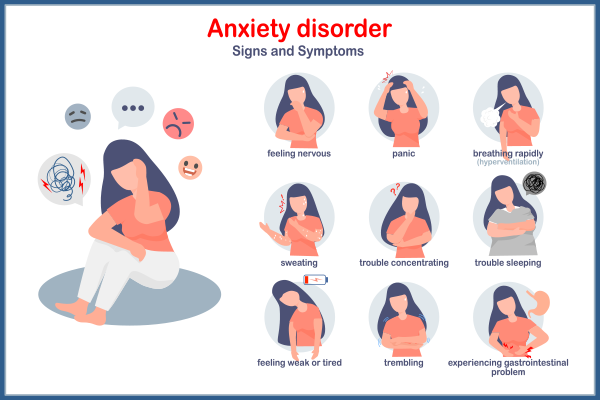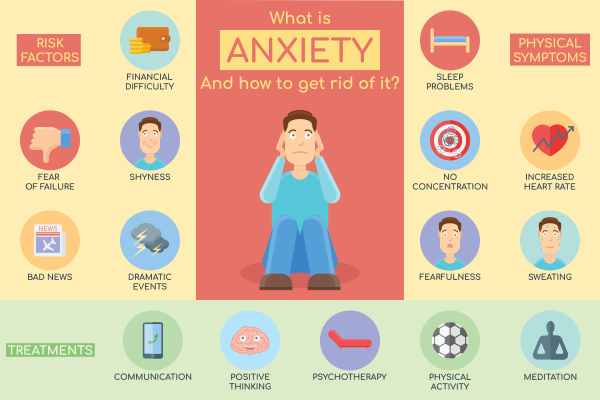
Anxiety is a natural response to stress, but for many, it can become overwhelming and disruptive. Understanding what happens in your brain during anxiety disorders can empower you to manage it more effectively. In this article, we will explore the neuroscience of anxiety, its aetiology, prevalence, and risk factors, and provide practical ways to reduce its impact on your daily life.

Synopsis
The Neuroscience of Anxiety
Anxiety originates in the brain and is driven by a complex interaction between different regions and chemicals. Here’s a closer look at the key players:
1. The Brain’s Alarm System: The Role of the Amygdala
The amygdala is a small, almond-shaped cluster of neurones deep in the brain. It plays a crucial role in detecting threats and triggering the body’s fight-or-flight response. When you encounter a stressful situation, the amygdala signals your body to release stress hormones like cortisol and adrenaline. This response is designed to keep you alert and ready to react.
However, in individuals with chronic anxiety, the amygdala may be overactive, perceiving threats where none exist. This can lead to generalised anxiety disorder (GAD) and chronic feelings of worry and fear.
2. The Prefrontal Cortex: Your Brain’s Rational Thinker
The prefrontal cortex is responsible for rational thinking and decision-making. It helps regulate the amygdala’s response and allows you to assess whether a threat is real or imagined. In people with anxiety disorders, the connection between the prefrontal cortex and the amygdala may be weaker, making it harder to calm down after a perceived threat.
3. The Role of Neurotransmitters: Chemical Messengers of Anxiety
Neurotransmitters are brain chemicals that influence mood and emotions. Three key neurotransmitters play a role in anxiety:
-
Serotonin: Low levels of serotonin are linked to increased anxiety and depression.
-
Dopamine: This neurotransmitter affects motivation and pleasure. An imbalance can contribute to anxiety disorders.
-
GABA (Gamma-Aminobutyric Acid): GABA is an inhibitory neurotransmitter that helps calm neural activity. A deficiency in GABA can lead to heightened anxiety and stress.
Etiology of Anxiety & Risk Factors
Anxiety disorders develop due to a combination of genetic, environmental, and psychological factors. Some key contributors include:
|
Risk Factor |
Description |
|
Genetics |
A family history of anxiety disorders can increase the likelihood of experiencing it. |
|
Brain Chemistry |
Imbalances in neurotransmitters play a crucial role. |
|
Personality Traits |
Highly sensitive, perfectionistic, or introverted individuals may be more prone to anxiety. |
|
Trauma & Stress |
Childhood trauma, major life changes, or chronic stress can trigger anxiety disorders. |
|
Medical Conditions |
Chronic illnesses, hormonal imbalances, and neurological disorders can contribute to anxiety. |
|
Substance Use |
Alcohol, caffeine, and recreational drugs can worsen anxiety symptoms. |
Prevalence of Anxiety: A Rising Lifestyle Disorder
Anxiety disorders are among the most common mental health conditions worldwide. Studies indicate that anxiety affects millions of people, with increasing prevalence among younger populations. The rise of social media stress, academic pressures, work stress, and economic uncertainties have contributed to making anxiety a lifestyle disorder.
|
Demographic |
Anxiety Prevalence |
|
Global |
1 in 13 people suffer from anxiety (WHO). |
|
Young Adults & Teens |
Higher rates due to social comparison, performance pressures, and digital overstimulation. |
|
Women |
Nearly twice as likely to experience anxiety as men due to hormonal fluctuations and societal expectations. |
The Spectrum of Anxiety: Different Types
Anxiety manifests in various forms, and recognising different types can help in seeking the right treatment.
-
Generalised Anxiety Disorder (GAD): Chronic and excessive worry about everyday activities.
-
Social Anxiety Disorder: Intense fear of social interactions and being judged by others.
-
Panic Disorder: Sudden episodes of intense fear accompanied by physical symptoms like rapid heartbeat and shortness of breath.
-
Phobias: Irrational fears of specific objects, places, or situations.
-
Obsessive-Compulsive Disorder (OCD): Repetitive thoughts and compulsive behaviors to reduce anxiety.
-
Post-Traumatic Stress Disorder (PTSD): Anxiety triggered by past traumatic experiences.
How to Manage Anxiety Effectively

1. Deep Breathing Techniques
Practicing deep breathing can help calm the nervous system. A simple technique is the 4-7-8 breathing method:
-
Inhale through your nose for 4 seconds.
-
Hold your breath for 7 seconds.
-
Exhale slowly through your mouth for 8 seconds.
-
Repeat several times to promote relaxation.
2. Exercise as a Natural Anxiety Reliever
Physical activity releases endorphins, which are natural mood boosters. Activities like jogging, yoga, or even a short walk can significantly reduce anxiety levels.
3. The Power of Journaling
Writing down your thoughts helps process emotions and reduce anxious feelings. Try journaling about what’s causing your anxiety and possible solutions.
4. Mindfulness & Meditation
Mindfulness meditation helps train your brain to stay present and reduces excessive worry. Apps like Headspace or Calm offer guided meditations for anxiety relief.
5. The Role of Nutrition in Anxiety
Your diet can impact your anxiety levels. Some tips for an anxiety-friendly diet include:
-
Eating more omega-3 fatty acids (found in fish, flaxseeds, and walnuts)
-
Reducing caffeine and sugar intake
-
Including probiotic-rich foods like yogurt and kimchi for gut health
6. Cognitive Behavioral Therapy (CBT)
CBT is a highly effective therapy that helps reframe negative thought patterns. It teaches practical coping skills to manage anxiety triggers.
7. The Importance of Sleep
Lack of sleep can make anxiety worse. To improve sleep:
-
Stick to a regular sleep schedule.
-
Avoid screens before bedtime.
-
Try relaxation techniques like reading or taking a warm bath.
While self-help strategies can be effective, professional intervention is sometimes necessary. If anxiety symptoms interfere with your daily life, seeking medical assistance from experts can make a significant difference.
Conclusion
At Manipal Hospital Dwarka, we offer comprehensive mental health services with experienced specialists in psychiatry and psychology to help manage anxiety disorders. Our team of experts provides personalised treatment plans, including therapy, medication, and holistic wellness programs.
Contact us for expert guidance. Take the first step towards a healthier mind. Book an appointment with our expert at Manipal Hospital Dwarka today.
FAQ's
Symptoms include excessive worry, restlessness, fatigue, rapid heartbeat, and difficulty concentrating.
While it may not be completely eliminated, it can be effectively managed with the right strategies.
Exercise, deep breathing, meditation, proper nutrition, and adequate sleep are beneficial.
Yes, caffeine can increase heart rate and trigger anxiety symptoms in some individuals.
Yes, genetics can play a role, but environmental factors also contribute significantly.
If anxiety interferes with daily life, relationships, or work, seeking professional help is recommended.



















 6 Min Read
6 Min Read










